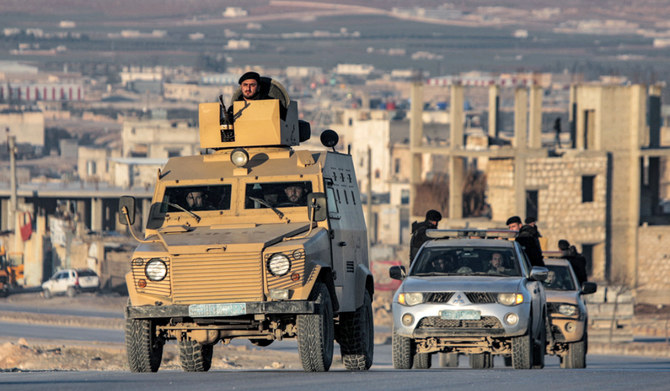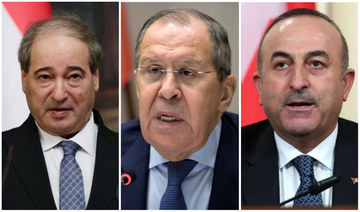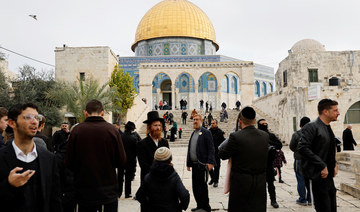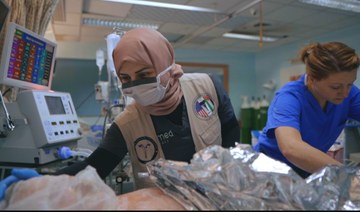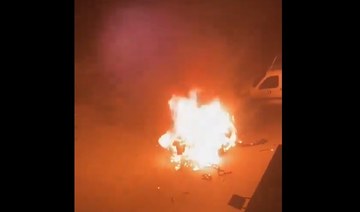ANKARA: Tehran announced its uneasiness about being sidelined from the recent meeting between Syrian and Turkish defense ministers and intelligence chiefs in Moscow with the mediation of Russia.
The critically worded comment came from Iranian Foreign Ministry spokesperson Nasseer Kanaani, who said during a press briefing on Monday: “Iran has always insisted on a political solution and not a military solution, and it insists on this position regarding Syria.
“Syria, Russia and Turkiye have recognized the crucial role of the Islamic Republic of Iran in fighting terrorism in Syria, supporting the government and people of the country, supporting the territorial integrity of this country and the process of resolving the Syrian crisis,” he added.
Iranian officials were absent at the Moscow meeting, but it is still unknown whether they will be invited to the next meeting that is scheduled to take place in the second half of January, most likely in Moscow, and this time involve foreign ministers.
HIGHLIGHT
Iranian officials were absent at the Moscow meeting, but it is still unknown whether they will be invited to the next meeting that is scheduled to take place in the second half of January, most likely in Moscow, and this time involve foreign ministers.
Turkiye, Iran and Russia launched together the Astana Process in 2017 in a bid to restore stability in Syria. But the war-torn country has been a source of competition between Tehran and Ankara since the beginning of the Syrian crisis, as Turkiye and Iran support opposing sides.
Iran considers the Syrian regime as key to confronting Israel, while Turkiye supported opposition groups fighting Bashar Assad’s regime.
Iran also attaches importance to the Shiite towns of Nabal and Al-Zahra in northern Syria and tries to keep them under its sphere of influence. However, a possible Turkish operation against Tal Rifaat to unite Turkish-controlled Afrin and Al-Bab regions would put these Shiite towns at risk of attack because of their proximity.
A possible Turkish military operation in northern Syria could also bring Turkish and Iranian proxies to the brink of clashes as Iranian-affiliated rebels and Kurdish units in Syria are cooperating against a possible Turkish offensive.
“Throughout the Syrian civil war, Iran’s official discourse always reiterated the necessity of a diplomatic resolution to the conflict and the futility of a military solution, despite its presence as the military mastermind of Assad’s ground war,” Dr. Gulriz Sen, an expert on Turkiye-Iran relations from the TOBB University of Economics and Technology in Ankara, told Arab News.
“Iran also expressed its desire to mediate between Turkiye and Syria several times and even hinted at hosting a meeting in Tehran to foster reconciliation. Tehran sees that this role resides with Russia, with President Vladimir Putin now acting as the major powerbroker,” she added.
According to Dr. Sen, Tehran also sees that the dynamics in the northern parts of Syria have been largely negotiated between Turkiye and Russia in the last few years, while Tehran’s position was to maintain close links to the Assad regime and coordinate with the Syrian government.
“Tehran would be content and relieved so long as the burgeoning talks between Turkiye and Syria serve its interests, which are keeping the Assad regime in power and Syria’s territorial integrity intact as well as curbing, and possibly ending, Turkiye’s military presence in the country,” she added.
Hamidreza Azizi, visiting fellow at the German Institute for International and Security Affairs, thinks that Russian mediation between Syria and Turkiye without the involvement of Iran is proof of Russian political leverage on the Assad regime and its role as a powerbroker in Syria’s conflict by organizing a series of talks to negotiate an end to the war.
“Since March 2020, Russian-Turkish bilateral cooperation began replacing the three-way framework that involves Iran as part of the Astana Process. But Iran still welcomes any initiative that prevents Turkiye’s military operation in the region,” he told Arab News.
In March 2020, Russia and Turkiye agreed upon a ceasefire in Syria’s rebel-held Idlib province, with a three-point agreement that was brokered by the Turkish and Russian presidents and that included the creation of a safety corridor.
“In the past, Iran itself offered mediation between Damascus and Ankara, but it proved unsuccessful. Although Russian mediation for Syria and Turkiye marginalized Iran to a certain extent, it is still in line with Tehran’s interests for the region,” Azizi said.
However, experts do not expect that an invitation will be extended to Iran for the upcoming trilateral meeting.
“Tehran may not be invited to the foreign ministers’ meetings in late January, and possibly it does not expect to be, as the process goes through Russian mediation, but Iran will be following the talks closely and making sure that its strategic calculations are duly reflected in the outcomes of the meetings,” Dr. Sen said.
In the meantime, Turkish Foreign Minister Mevlut Cavusoglu gave further details about the upcoming meeting during an interview with CNN Turk on Tuesday.
“All decisions about Syria cannot be taken in just one meeting. All these steps (are) aimed at building trust and preparing the ground for further cooperation over sensible points in the coming period,” he said, adding that the Syrian regime is eager to cooperate on the repatriation of Syrians.



